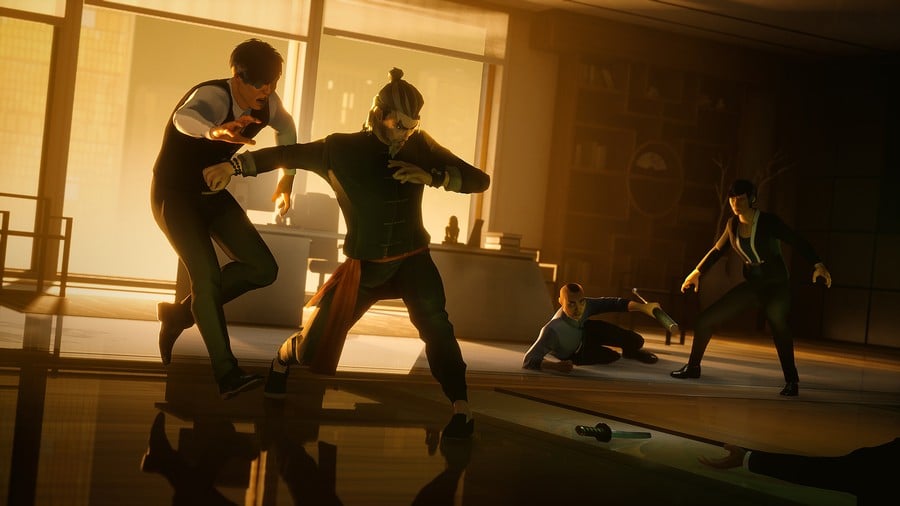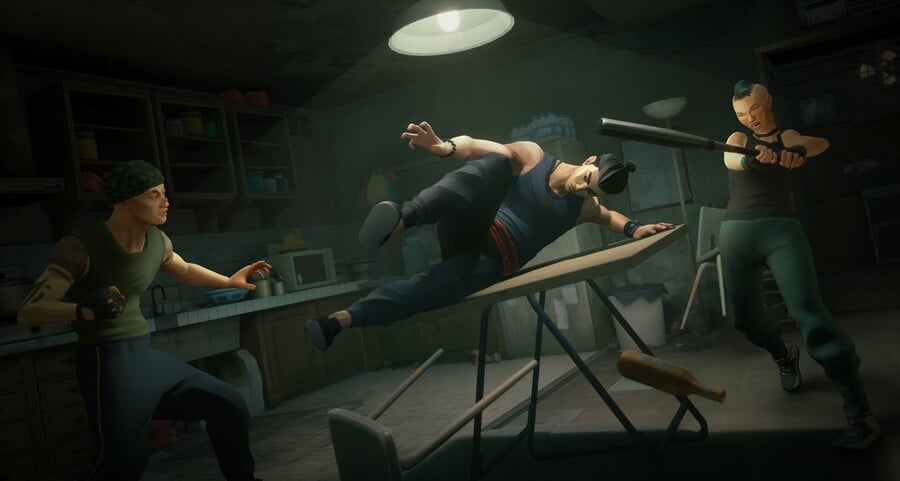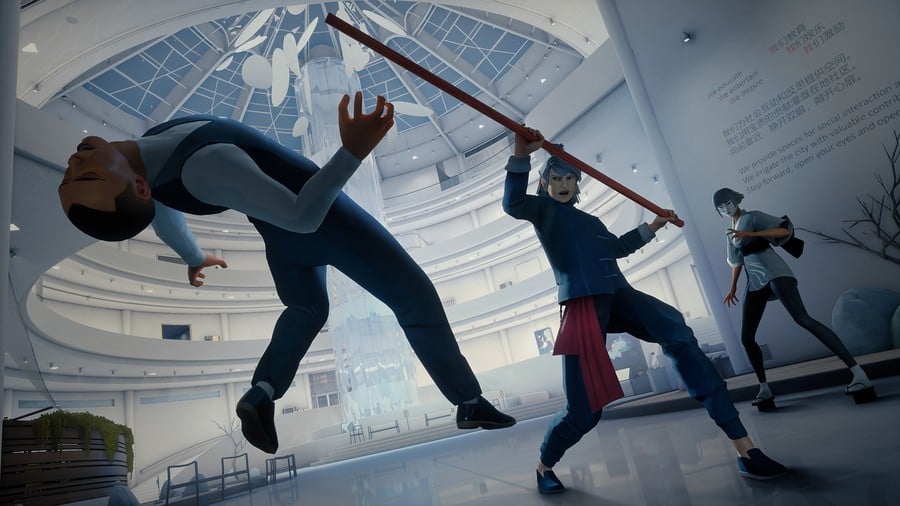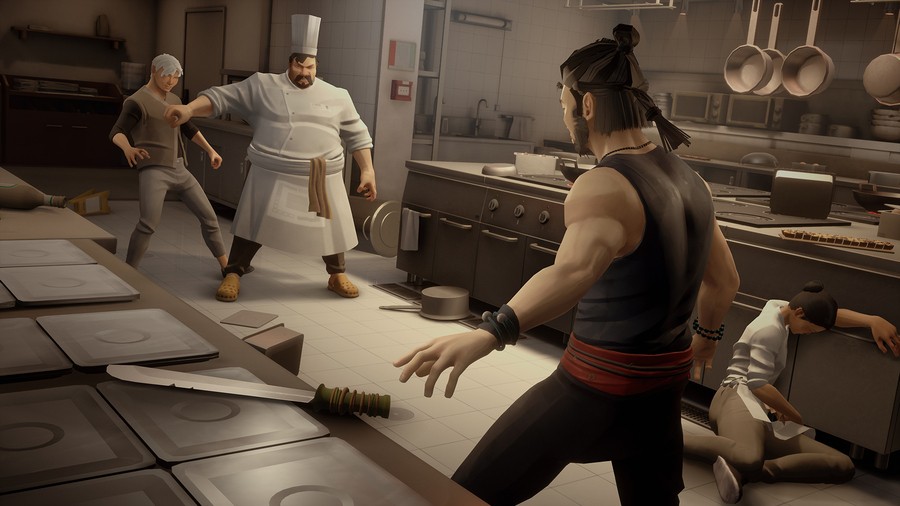
Sifu can be an extremely difficult game, particularly in the beginning. It poses a steep learning curve from the start, and we're willing to be that just about everyone who plays it will hit a brick wall when they get to the second boss — or thereabouts.
Luckily for you, we've poured hours into Sifu and we've got borderline essential advice for those who might be having trouble. Again, Sifu can be brutal. It's a game that forces you to learn from your mistakes and go again (and again, and again) if you want to beat it.
Below, you'll find our most important hints and tips for surviving Sifu.

Avoid, Avoid, Avoid, Avoid, Avoid, Avoid, Avoid
Let's start with that is easily the most important point of all: learn how to avoid, and use it as you main form of defence whenever you can.
Sifu doesn't make it very clear, but trust us: Avoid (holding block and then flicking up or down on the left stick) is the most reliable defensive technique that you have. Avoiding correctly allows you to completely dodge incoming attacks while maintaining close distance to the opponent so that you can counterattack.
For normal enemies, avoiding lets you easily punish their combos. Against bosses, avoid is often a necessity — and again, the game doesn't do a great job of explaining this.
Avoiding is much easier to get right than parrying or using R2 to quickstep. Sifu makes it sound like all forms of defence are equal, but that's simply not the case. While parrying and quicksteps definitely have their uses, your avoid is, in most situations, the safest option.
While you do have to time avoid correctly in order to not get hit, avoid's timing window is much more forgiving than parrying or sidestepping. The only issue with avoid is that you'll need to react to both high and low attacks.
- High attacks are any attacks that hit above your character's waist
- Low attacks are any attacks that hit below your character's waist
The vast majority of attacks in the game are high, but low attacks become more and more common as you progress. With this in mind, you should try to use a combination of avoid and block. If you're not sure whether an opponent is going to use a high or a low, try blocking first and then avoid the attacks that follow.
Avoid is also invaluable in that successful avoids lessen your structure (stamina) bar, which in turn allows you to block more. Balance avoid with block, and you should be much harder to kill.

Bosses Are Meant to Be Roadblocks
There isn't a single boss in Sifu that's easy to beat on your first attempt. They all have their own unique set of attacks and demand some degree of trial and error — there's just no way of knowing what you're up against until you've been beaten down at least once.
Some bosses require you to remember attack patterns so that you can avoid them correctly, and like it or not, this is just part of the process. What we're trying to say is: don't let the bosses discourage you. Like just about everything else in Sifu, bosses are only difficult until you know what's coming. Once a battle is committed to muscle memory, it's just a case of keeping your cool.
Use Your Old Age to Your Advantage
When you die in Sifu, you death counter is added to your age. And with every decade that you hit — 30s, 40s, 50s, 60s, and 70s — your overall health decreases, but your attack damage increases.
Obviously, the overall goal of Sifu is to beat the game at the lowest age possible — almost like a high score. But don't feel like it's game over if you hit old age. The rebalancing of your character can actually be a boon — but only if you make proper use of it.
When you're old, try to play much more defensively. You have less health to work with, so not getting hit should be your main priority — but at the same time, you deal much more damage whenever you're able to counterattack an opponent.
As they say, with age comes wisdom. Playing with more caution when you're in your 50s, 60s, and 70s can make a huge difference because of the additional damage that you're able to dish out in quick bursts. With the attack bonuses, you no longer have to chip away at enemies — just wait for the perfect time to strike and hit them with everything you have.

Sweep the Leg
Your standard leg sweeping attack (back, forward, triangle) is an amazing tool against lesser opponents. If you're up against multiple weaker enemies, try to add leg sweeps to the end of your combos — or just throw it out whenever you think that you can get away with it.
Putting an opponent on the ground instantly gives you time to breathe. What's more, mounting a downed enemy (hold circle next to them) makes you invincible during the animation where you punch them in the face. Again, this gives you valuable time to assess the situation and regain some of your structure bar.
Against tougher enemies or bosses, however, sweeping the leg doesn't always work. In these fights, only use it when you're absolutely sure that it'll succeed.
Never Feel Bad About Using Weapons
Your enemies will show you no mercy whatsoever in Sifu, so make sure that you do the same to them. Pick up weapons whenever you can and use them to batter the opposition.
Weapons provide their own set of attacks (depending on the weapon type) and, crucially, weapons deal more damage than your fists. What's more, your structure bar builds up more slowly when blocking with a weapon.
Of course, good things can't last forever, and weapons will break after a set amount of hits (and blocks). Weapons can also be knocked from your grasp if you're hit with powerful attacks, meaning that they probably won't last long against bosses.
Still, their finite nature only emphasises the fact that weapons are there to be used. No mercy!

Prioritise Permanent Unlocks of Your Favourite Moves
Sifu's skill tree is a fickle thing. When you get a game over, you'll lose all of your skill tree progress — unless you've taken the time to permanently unlock some abilities. Purchasing moves multiple times unlocks them forever, and we'd recommend going for permanent unlocks sooner rather than later.
While you will need to dump a lot of experience points into permanent unlocks, it's worthwhile in the long run. Especially when you're just starting out, having permanent access to skills like Environmental Mastery — which allows you to kick objects at enemies — can be a huge help.
It should also be noted that progress towards permanently unlocking a skill remains even after you get a game over. For example, if you need to buy a move five times to permanently unlock it, and you purchase it three of those five times, the game remembers that you only need two more buys on your next run. That's a lot more forgiving than you might think!
Focus!
Your focus bar should never be ignored. In the beginning, you only have access to one focus attack — the eye jab — but you can unlock more through the skill tree. Focus attacks are incredibly useful throughout the game, allowing you to slow time and pick a powerful move.
Your focus bar fills quickly. You can quite easily make use of multiple focus attacks in one fight once you know what you're doing, because avoids, parries, and successful hits all add to it. With this in mind, you shouldn't be afraid to spend it. We're not saying that you should unleash focus attacks at will, but using it when things get even mildly tricky is better than saving it for no real reason.
You'll soon realise that most of the focus attacks on the skill tree require multiple focus bars to use. Unfortunately, you can only increase your focus bar at jade dragon statues scattered throughout levels -- and the upgrades are not permanent. You'll need to decide whether increased focus is something that will benefit your style of play.

Focus! Again!
Our final piece of advice is quite sneaky. When you hold L2 to focus, time will slow. This happens regardless of whether you actually have enough focus to use a focus attack.
Turns out, you can use this to your advantage. Holding L2 to slow time means that you can look at what enemies are doing in relative safety — sometimes you can even tell what move they're about to use, and then react to it a lot better than you might have been able to in real time.
Some might say this is cheating, but again, Sifu is very, very difficult, and you should take every advantage you can get. Think of slowing time as a learning tool — you can use it to better examine the competition.
Do you have any Sifu hints, tips or advice? Be like water and share your knowledge in the comments section below.





Comments 9
Gotta feeling this guide might get a healthy amount of clicks!
Great article! Thanks.
I had to write this article after seeing so much gameplay where players simply don't dodge. 'Avoid' is easily the best way to survive long fights in Sifu, but the game doesn't really tell you how good it is.
Sifu's always going to be a super hard game, but hopefully this guide helps!
Nice guide! I've already found out the hard way about avoid - until I worked out its value I was dashing about with R2 like an absolute madman. The fact it keeps you close to the enemy is so important when you spot an opening.
I did pretty well I thought in the first level. I only aged up to 26 but that's all I've gotten the chance to play so far. The only thing that's killing me a lot with the avoid mechanic is my mind tells me "If they are going low, the analog stick goes down." It's my fighting game mind thinking about blocking low instead of avoiding low that is messing me up.
Still from what I've played anyway it's really fun!
I'm on the final boss, and I'm 50 years old and I'm getting my ass handed to me. I didn't realize how much I depended on focus until I got to him... Especially considering how easy the previous boss was. I may just redo the previous level, so I'm a little younger.
That's a good tip though, is if you're getting beaten down on a level, try and redo the previous one and master it, and really use the second level to hone your abilities. You have to fight A LOT in that level, and the shortcut doesn't skip a whole lot.
Started playing few hrs ago, wow this game is really hard, came here hoping for tips lol. Going to try using avoid now, been trying to parry and dash around, done the first level age 24 so that was good 2nd level is bloody hard so far. I think this game could havd done with a good tutorial as its pretty much trial and error. Its a good game but hard, really hard lol.
@Korgon I did the exact same thing with avoids at first. Flicking down to block low and up to block high. Definitely a fighting game thing!
Thanks for the helpful guide, will definitely come in handy when I eventually buy Sifu.
Show Comments
Leave A Comment
Hold on there, you need to login to post a comment...